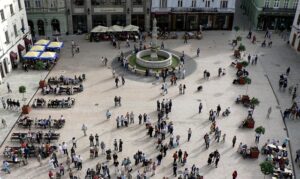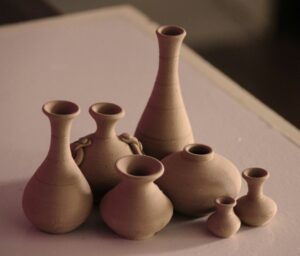Recently I was caught up in the cares of my world and overextending myself. I felt anxious about both exciting and hard things happening in my life. I was seeking God but felt like I was missing his voice. My soul felt as if surrounded by choppy waters. When this occurs periodically in my life, I know it is time to pause and pay attention to what is happening within my soul. As I listened to my body, I knew that I desperately needed rest, but after a few days of physical rest I noticed my soul was still weary. So I put aside the plates that I spin to retreat away with God.
While away, I noticed my deep longing to rest and drink by the still and living waters that satisfies and restores my soul. As I reflect on my need for rest, I notice that rest, silence, and solitude are vital practices for following Christ but often feel impossible to implement. As followers of Christ we are aware of our need for rest, and are well intentioned about needing time apart with God, but none of us are immune to the forces that set themselves against the kind of life Jesus invites us into.
Our seasons are packed with people and calendars of all kinds – school, work, holidays, church programs, meetings, yard work, festivals, and sports events. If we aren’t careful, our schedules and commitments steer us away from abiding in Jesus one degree at a time, which leaves us in a frenzy of striving and leading our own lives.
Matthew 11:28 in the Message invites us to come away with Jesus to recover our lives, so that we can learn “how to take a real rest,” to watch and learn how God works in the “unforced rhythms of grace,” to “live freely and lightly.” Resting with God is not vacation or “me” time, it leads us to be with God and watch how he works, and to live into our identity as image bearers of the God who rests. Are we watching and learning from God’s rhythms of rest and grace filled work?
In watching God, in the beginning, he spoke and set life into motion. He made the moon and the stars to guide creation through nights, days and seasons to mark the times, which steers plant life, animals, and people to all have rhythms of waking and sleeping, of being active and at rest.
In the Old Testament, days start with sleep in the evening as described in the language of Genesis 1, “and there was evening and there was morning, the first day.” On the 7th day, which would later be seen as the first day of the week, God rested. I wonder what would result from viewing rest as what we do BEFORE we work?
Rest is our teacher. It helps us gain perspective and space to simply receive from God. In Exodus 20, God gave Israel the gift of Sabbath after delivering them from the slavery of endless work to Pharaoh. Jesus also practiced Sabbath and demonstrated the rhythm of engaging and retreating and taking time apart—even from the disciples—to be with His Father.
Like Jesus, we pour out to many people in our churches, families, and community. We do this because we are passionate, gifted, and have been called by God to be vessels of His mission in the world. But we are often tempted to depend on our gifts, resources and responsibilities. It is not long before we forget that apart from abiding in Christ who rests, we can do nothing (John 15:5). And quickly and unintentionally we become enslaved back to Pharaoh.
There is a universal law in physics that says once things are set in motion, it takes another equal or opposing force to stop or change that motion. Whether it is practicing silence five minutes a day, or practicing weekly Sabbath, or retreating for even a few hours each month, we slow down and embrace quiet. Rest is the motion that rebalances our fast paced overstimulated lives.
So what exactly do we do when we rest? Saundra Dalton-Smith is a physician and author who talks about how sleep and rest are not the same. She says we are high achieving, chronically tired individuals who do not understand the power of rest. We often operate with rest deficits and do not focus on the type of rest needed for restoration. She lists seven types of rest. In addition to physical rest, we need mental; spiritual; emotional; social; sensory; and creative rest. How are you being intentional about rest in the various areas?
When we rest we become present to God and ourselves. It leads us to surrender control, say “no” to people, technology, and tasks, and entrust all things to God. This can be scary. Ruth Haley Barton says that as we rest, we come into God’s presence and we “come home to ourselves.” In God’s presence we are in the Garden of Eden, called to live unashamed before God and without coverings. And before God our masks and inner motivations become evident – it might be our need for control, performance, perfection, or being unique or knowledgeable in our field. Face-to-face before God we cannot hide. Rest gives us space to breathe and reflect honestly and authentically with God and ourselves. What masks become evident in rest as you come face-to-face with God?
In looking back at how God made creation, even water cycles have rest. In Genesis, God commanded the chaotic waters to form by giving them purpose and order, turning them into seas with boundaries, rivers to flow from mountains, and streams that collect into pools. He made waves to retreat and then pour forth into the sand. He made their currents to flow from high tide to low tide. They evaporate into the skies, accumulate, and then wait and rest until it is time to pour out onto the earth for its nourishment.
In the same way, as we retreat and rest like the tides and the waves, it enables us to later pour out like rain filled clouds to nourish those around us. As Jesus said in John 7, ““All who are thirsty should come to me! All who believe in me should drink! As the scriptures said concerning me, rivers of living water will flow out from within him.” Resting is about drinking from Jesus and His presence flowing outward through our lives towards others and the world.
Prayer: May we ponder the works of His hands and stretch out our hands to God, for our souls thirsts for God like a parched land (Psalm 143:5-6). Lord, water the parched soil of our souls as we walk with you and watch and learn from the works of Your hands—who made creation with rhythms of rest—and whose hands at the cross were surrendered and opened wide. You let go of everything You could control to entrust yourself to the Father’s will. May our lives echo Your work of resting, letting go, and entrusting ourselves to you for the sake of others.




